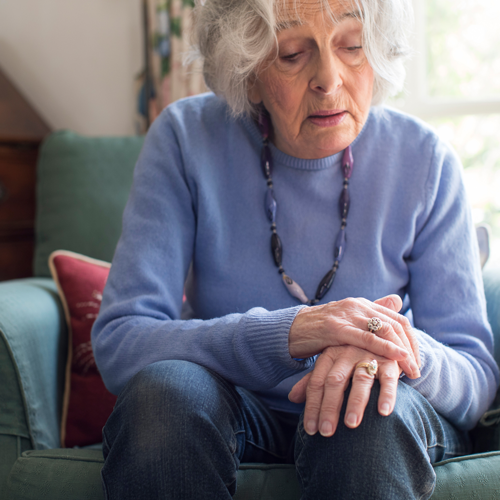Parkinson’s disease (PD) is a neurodegenerative brain disorder that progresses slowly in most people. PD targets and affects the central nervous system and impacts more than 1.5 million people in the United States. Due to the nature of PD, the symptoms typically get worse over time. Most physicians focus on treatments that help control the symptoms of PD that enable you to manage your PD and enhance your quality of life.
Parkinson’s disease can cause several different symptoms. The specific symptoms that an individual may experience vary from person to person and case to case. Some of the most common symptoms of Parkinson’s disease are:
- Tremor of the hands, arms, legs, jaw and face
- Rigidity or stiffness of the limbs and trunk
- Slowness of movement
- Postural instability or impaired balance and coordination
- In some cases Parkinsonian type Dementia
Navigating the Daily Challenges of Parkinson’s Disease at Home
Caring for a loved one with Parkinson’s disease can be challenging, but with the right strategies and support, you can provide the best possible care for your family member while looking after your own needs and well-being.
Here are some Parkinson’s friendly tips for caregivers to help their loved ones to stay vital, active, and independent:
- Learn about Parkinson’s: Understanding Parkinson’s symptoms, how it affects individuals differently, and the disease progression can help you better anticipate your loved one’s needs.
- Establish a routine: Creating a daily routine can help provide stability and predictability for both you and your loved one. Consistency can reduce anxiety and make daily tasks more manageable.
- Know how to manage medications: Parkinson’s medications are crucial for symptom control. Ensure your loved one takes their medications on time and as prescribed. Keep track of dosage schedules and discuss any side effects with their healthcare provider.
- Seek professional guidance: Your loved one’s healthcare team can provide insights into managing symptoms and ways to enhance your loved one’s quality of life.
- Simplify daily living: Adaptive strategies, like using grab bars and special utensils, can help your loved one maintain more independence with daily activities like dressing, eating, and grooming. Modify your loved one’s living space to minimize obstacles and make things easier.
- Practice good communication: Patience and active listening are vital when caring for someone with Parkinson’s. Apps specifically designed for people with Parkinson’s may also help improve communication.
Consider joining a Parkinson’s support group or speaking to a counselor or therapist. Caregiving can be emotionally taxing, and talking to others who understand your challenges can be helpful. Respite care can also be a tremendous help, providing much-needed breaks from caregiving duties.
How In-Home Care Can Help
Our experienced in-home caregivers can help with the day-to-day needs of caring for a loved one with Parkinson’s disease, including:
- Meal preparation: Nutritional considerations are especially important for people with limited mobility. An in-home caregiver can help prepare nutrient-rich, pre-portioned meals for a single day or even the whole week. This can make mealtimes less stressful.
- Mobility assistance: Our caregivers can provide mobility assistance to help prevent falls and ensure your loved one can move around safely.
- Companionship: Our in-home caregivers provide companionship and emotional support, which can help reduce feelings of loneliness and isolation seniors with Parkinson’s may experience.
- Physical exercise: Our in-home caregivers can monitor your loved one during exercise, providing help with walks and physical therapy exercises.
- Transportation: Our caregivers can provide transportation to critical meetings such as doctor’s appointments, follow-up medical visits, personal appointments, grocery shopping, hair and beauty salon outings, and visits to friends and family members.
- Respite for family: Perhaps most importantly, in-home caregivers offer family members much-needed respite. Taking breaks from caregiving can help reduce stress and prevent burnout, allowing you to recharge and provide better care.
Caring for a loved one with Parkinson’s disease can be emotionally and physically demanding. We’re here to help, providing specialized care for individuals with Parkinson’s. Seeking support is a sign of strength and love, and you don’t have to navigate this journey on your own. Reach out to us for a comprehensive in-home consultation today.

Care To Stay Home helps to make life at home easier for your loved one living with Parkinson’s disease. As your loved one loses the ability to control their movements, their ability to perform certain tasks becomes more difficult. Our professionally trained Caregivers are there to assist and extend the quality of life, even as symptoms progress. We continually monitor and oversee the management of our Caregiving staff to ensure a safe and comfortable home environment. As the needs of our clients change and progress, we adapt our services to meet the needs of our clients.
Talk with our Care Managers or schedule your free in-home assessment.
Our Care Managers can meet with you to discuss your specific care needs and perform consultations at home or in a hospital or facility setting. We are also able to coordinate that care with the medical professionals overseeing treatment, including care related to dementia care in Spokane, such as the doctor’s office, home health team, therapists and other medical teams as needed. We strive to coordinate our care with the medical professionals attending to your loved ones medical needs.
We have Caregivers who are familiar with Parkinson’s disease. They can assist with:
- Personal Care: Bathing, dressing , personal hygiene & grooming, etc.
- Mobility Assistance: transfer assistance, ambulating/walking supervision and assistance
- Physical Exercise: Supervise exercise routines, range of motion, etc.
- We are community partners of the Parkinson’s Foundation.


